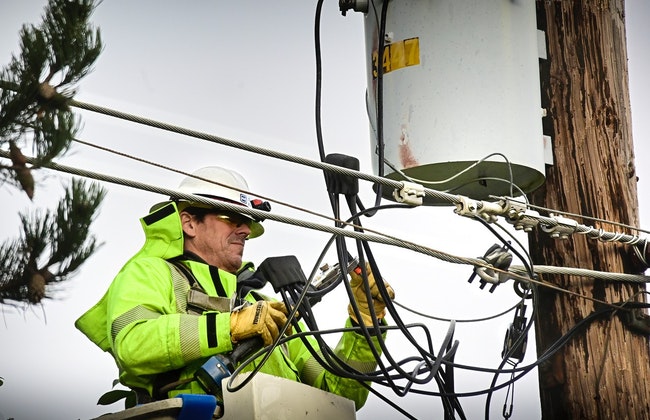
On a rainy, and windy day, Feb. 15, a lineman for Salem Electric works to repair power lines damaged by a weekend ice storm. (Ron Cooper/Salem Reporter)
Nearly 24,000 residents of Marion County are at risk of having their electricity or gas shut off when a statewide moratorium on disconnections of residential expires at the end of July.
The Oregon Public Utility Commission enacted the moratorium earlier in the pandemic as people across the state were losing jobs. In May, it approved a final one-month extension of the moratorium that’s now slated to end on July 31.
“COVID-19 has caused significant hardship for households that have struggled to pay their energy bills in the past and also for many who have never before sought assistance. Receiving a disconnection notice adds to the stress that these households are experiencing,” Megan Decker, the commission’s chair, said in a statement. “However, utility service cannot be provided at no cost, and customers with past due bills need to begin engaging now with utilities and assistance providers to get help and connect to payment options.”
There are 253,395 Oregon customers of investor-owned utilities behind on bills owing a total of $89.37 million, according to April data from the commission. An analysis of that data by Salem Reporter found that 23,839 of those customers reside in Marion County and together owe $8.4 million. In Polk County, 5,050 residents owe $1.63 million on utilities.
In March, a data analysis by Salem Reporter found that ZIP codes in the Salem area had some of the highest concentrations of customers behind on their utilities in the state.
The most recent data shows more of a mix of ZIP codes from the Portland area and southern Oregon as having the highest numbers of people behind on electric or gas bills. But the Salem-based 97301 ZIP code had the second-highest number of people behind on utilities behind the Jackson County-based 97501 ZIP code.
There are 2,959 Portland General Electric customers behind on bills in the 97301 ZIP code, which includes central and northeast parts of Salem. They owe a combined $1.41 million. The average amount owed by each customer is $476. Census figures show that the ZIP code’s annual median income is $43,841, below the $60,178 average for the Salem area.
The 97305 ZIP code, which includes parts of northeast Salem and Hayesville, had the fourth-highest number of people behind of any Oregon ZIP code. According to commission numbers, 2,678 Portland General Electric customers in the ZIP code owed a combined $1.17 million to the utility. The average amount owed by each customer is $439. The ZIP code also had a median household income lower than the rest of the area at $52,533, according to Census figures.
Compared to numbers released by the commission in March there are over a thousand fewer people in the two Marion County ZIP codes that owe money to the utility.
Of all customers statewide behind on payments, 87,000 had past-due balances over 90 days, according to the commission. That’s a 233% increase from before the pandemic. The total amount owed on balances that are over 90-days due rose to $67 million, an 892% increase from before the pandemic.
Kandi Young, commission spokeswoman, said in an email that the average amount owed increased to $771 in April from January’s $600.
She also pointed to a more positive trend in April’s numbers that show a 5% decline in residential customers with balances that are over 90 days past due compared to January.
But the bills are coming due, and investor-owned electric and natural gas utilities will be able to issue the first 15-day late notice to customers as early as July 16.
“Utilities are to make their best efforts not to disconnect customers who have taken steps with their utility service provider to participate in a utility debt relief program, to set up a time payment arrangement, to make partial payments, or who are actively seeking energy assistance from a partner organization,” Decker said in a statement.
Andrea Platt, spokeswoman for Portland General Electric, urged people who are behind on payments to be in touch with the company, which she said is offering multiple financial aid programs that include payment matching.
“We really view disconnection as a last resort,” she said. “We know that customers have been adversely impacted and that’s why we have an expanded set of programs. We get it; it’s been tough.”
Tom Gauntt, spokesman for Pacific Power, also pointed to financial aid programs including grants of up to $500 and other payment plans.
NW Natural Elaina Medina said in an email that “our goal is to do what we can to help every single one of our customers and keep their service connected. We have continued to reach out to customers who have fallen behind, and we encourage them to call us so we can work through payment plans and energy assistance options.”
She also pointed to the utility’s grant program and its low-income assistance program.
Contact reporter Jake Thomas at 503-575-1251 or [email protected] or @jakethomas2009.
JUST THE FACTS, FOR SALEM – We report on your community with care and depth, fairness and accuracy. Get local news that matters to you. Subscribe to Salem Reporter starting at $5 a month. Click I want to subscribe!









